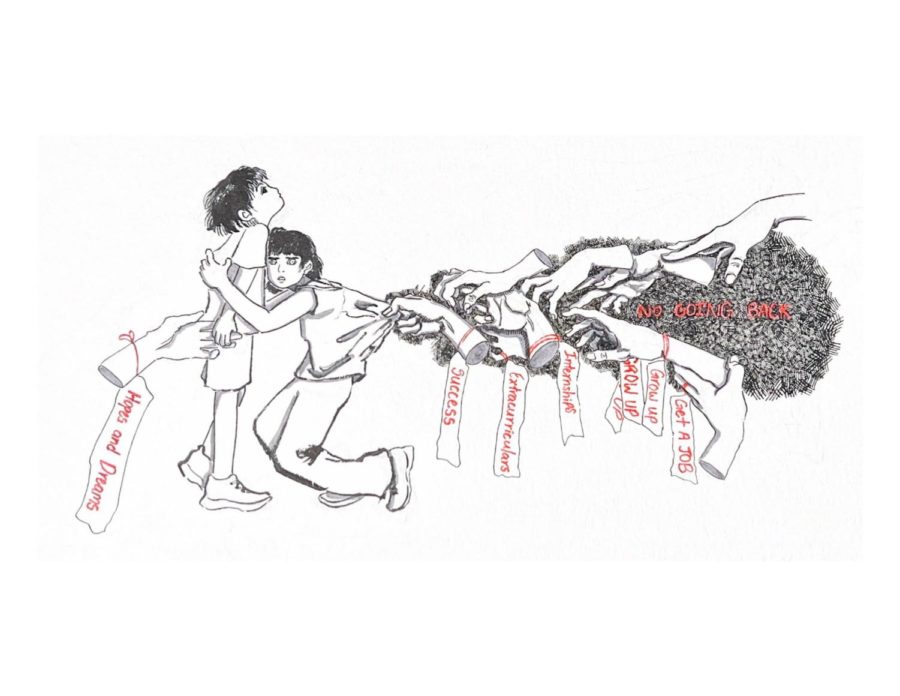My father is a professor. For as long as I can remember, he would spend his days poring over scary-looking books in silence—underlining, highlighting, scribbling in the margins. Before I even knew how to read, I remember highlighting all the words in one of my own picture books, a haphazard attempt at imitation. For most of my life, I had no more than a superficial understanding of what exactly my dad did for a living. Of course, the discussion of ideas is an important way of understanding them, which was an aspect of academia I wasn’t often able to witness firsthand. Nevertheless, while growing up, I never really questioned the value of solitary immersion, of losing the self in otherworlds of thought. It was more or less a given to me, the notion that thinking was like breathing: something precious, intimately fundamental to life, so much so that I hardly ever thought about it until a few years ago. By that time, what you might call disillusionment with the ivory tower began to set in. It suddenly became difficult to see what contributions an academic makes toward society—particularly since such contributions are seldom tangible, at least in the short term.
The parallels to our lives as students at the University of Chicago aren’t so hard to see. The University is an academic institution. It exists as a place of scholarship, and its contributions toward such aims are immeasurable by virtue of their meaning, not their volume. But as Zelda Mayer is right to point out in “Putting it into Practice” (1/17/14), we often find ourselves in a conscious struggle to act consistently with our ideals, particularly when it comes to those such as social justice or morality. Compare that to Clair Fuller’s observation in “Myopic Nooks” (12/3/13) of our tendency to forget our part as residents of Hyde Park, as residents of the world, etc. Our individual interests and the community that surrounds them can similarly be inextricably and uncomfortably joined.
To be sure, the University as an institution provides enormous concrete benefits to its community and its neighbors. Its presence brings jobs, security, and commercial development to Hyde Park. At the same time, nothing it can do should exempt it from behaving responsibly toward the surrounding community. The big question is one of duty: What does the University owe to the public sphere that it’s a part of? By simply existing in the first place, and by pursuing its (mostly) educational enterprises, does the University become responsible for, say, opening a trauma center? This is a pretty serious question to answer; one could well argue that we should address some issues with first-aid kits first.
Societies and institutions are, by nature, a mess to dissect. As individuals, members of the University of Chicago have a ton of different interests, not all of them academic. Some want to go to graduate school. Others want to enter investment banking. Some want to work in education, and still others want a career in government. Divide and conquer—sometimes, it works pretty nicely. Following our own interests has broader implications; it determines if we end up contributing to the general welfare or drawing from it. By all means, we should engage in whatever community we happen to be a part of as circumstance compels us, and at the very least in issues that pertain to our own interests. It’s a noble thing, to devote one’s life to speaking for those who don’t have that privilege. At the same time, doing something that you don’t have a passion for, and thereby living an unfulfilling life, does nobody a favor.
Even outside of foreseeable outcomes, I would maintain that it’s possible for our intentions to justify themselves. Perhaps the practicality of going about one’s own business has a deeper—dare I say it, theoretical—foundation. We should display intellectual curiosity in all pursuits while doing justice to our passions. That embodies a sort of morality, doesn’t it? To respect our freedom to do our thing, we should do our thing. It’s a matter of self-respect, not pride. Good Will Hunting and Plato have that much in common. If nothing else, that should elicit a sigh of relief.
My “thing” seems to lie somewhere in research. I’d like to think it wasn’t inherited, but it probably was, and I’ve decided that I’m OK with that. As it’s turning out, coming to terms with your passions is easier than actually pursuing them, and I’m OK with that, too. In fact, I remember there was a place called a library where my father stayed for many of his waking hours. Some nights I would be awake when he returned, and I’d fall asleep to the rain-like pitter-patter of typing on a keyboard.
Ken Jung is a first-year in the College.








